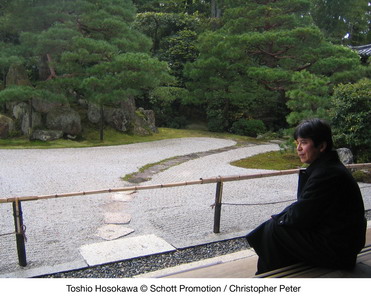TOSHIO HOSOKAWA: LANDSCAPES / ECM New Series 2095 player
ECM’s ongoing series of recordings with the Munich Chamber Orchestra continues with an intriguing album of new and recent pieces by Japanese composer Toshio Hosokawa. Amongst the featured compositions are “Sakura für Otto Tomek” and “Cloud and Light”, both written in 2008, and “Ceremonial Dance”, written in 2000. These 21st century pieces are brought together with “Landscape V” (originally from 1993 and for string quartet, and subsequently expanded into an orchestral version).
 Born in Hiroshima in 1955, Hosokawa was initially inspired by Western art music from Schubert to Schoenberg, and came to Germany in the 1970s to study with Isang Yun and Klaus Huber. As he strengthened his standing in the European and international avant-garde he also put down deeper roots in Japanese traditional music, his work often suggesting a dialogue between East and West, between the archaic and modern, between ceremonial music and concert music. Hosokawa considers his compositional process instinctively associated with Zen Buddhism and its symbolic interpretation of nature and the inter-relatedness of things and concepts. Involvement with traditional music led Hosokawa to study the shō, the ancient Japanese mouth organ with 17 bamboo pipes.
Born in Hiroshima in 1955, Hosokawa was initially inspired by Western art music from Schubert to Schoenberg, and came to Germany in the 1970s to study with Isang Yun and Klaus Huber. As he strengthened his standing in the European and international avant-garde he also put down deeper roots in Japanese traditional music, his work often suggesting a dialogue between East and West, between the archaic and modern, between ceremonial music and concert music. Hosokawa considers his compositional process instinctively associated with Zen Buddhism and its symbolic interpretation of nature and the inter-relatedness of things and concepts. Involvement with traditional music led Hosokawa to study the shō, the ancient Japanese mouth organ with 17 bamboo pipes.
Mayumi Miyata, perhaps contemporary music’s best-known shō player, is heard here with the MKO in a recording made at Munich’s Himmelfahrtskirche (Church of the Ascension) in October 2009. Here she plays unaccompanied shō on “Sakura”, Hosokawa’s adaptation of a traditional Japanese piece, and ‘solos’ in Hosokawa’s music for orchestra and shō. Miyata’s previous ECM appearance was on Helmut Lachenmann’s “Das Mädchen mit den Schwefelhölzern”.
Paul Griffiths describes the internal processes of Hosokawa’s music in the liner notes: “The interplay of shō and strings, and in particular their mutual imitation, is the driving force – or perhaps one should say ‘drifting force’, given that the music carries itself so lightly. These two central components moving in tandem – separately, together or, most often, in parallel, building harmonies that repeat each other’s with slight variation – suggest the confluence of vapour and light of which clouds are made. The brass, comprising four horns with trumpet and trombone, can do this too, or provide the illusion of weight that may also be found in cloudscapes, while the percussion, especially the fūrin (small Japanese wind bells) add twinklings of brightness. Almost everything, though, is centred in the shō and its world of far-off harmonies, soft yet scintillating – harmonies as impalpable and ever-changing as clouds. Like clouds, Hosokawa’s music is constantly in motion yet constantly the same. As the piece continues, its effect is of observing clouds in a largely peaceful sky, clouds that are mostly white but occasionally show shadows and briefly stir into more turbulent action.”
Landscapes is ECM’s second reckoning with Hosowaka: his music was previously featured on the critically acclaimed Yun/Bach/Hosokawa album of Thomas Demenga (ECM 1782), issued a decade ago. Since then, the composer’s music has been heard with increasing frequency in Europe. In July of this year, Hosakawa’s opera “Matsukaze”, with choreography by Sascha Walz, was premiered at the Berlin Staatsoper and received much positive media attention including a full page in the NY Times.
Born in Tokyo, Mayumi Miyata is a graduate of the Kunitachi College of Music, where she majored in piano, and began studying gagaku court music. John Cage created a number of works for Miyata in the last years of his life, and she has also premiered works by Tōru Takemitsu, Toshi Ichiyanagi, Maki Ishii, Joji Yuasa, Klaus Huber, and others. Her students have included Kō Ishikawa, recently heard on ECM with Evan Parker’s Electro-Acoustic Ensemble (“The Moment’s Energy”).
Landscapes is the tenth ECM release to feature the Münchener Kammerorchester, following recordings with music of Karl Amadeus Hartmann (Funebre), Sofia Gubaidulina, Bach/Webern (Ricercar), Tigran Mansurian (Monodia), Barry Guy (Folio), Giacinto Scelsi (Natura Renovatur), Valentin Silvestrov (Bagatellen und Serenaden), Joseph Haydn/Isang Yun (Farewell) and Betty Olivero (Neharót). The Orchestra was founded in 1950 and directed by Hans Stadlmair for almost thirty years before Christoph Poppen took over in 1996, soon developing its present day profile with innovative programming and new concert formats. Alexander Liebreich, who has been the orchestra’s artistic director since the 2006/07 season, was born in Regensburg in 1968. He first studied Romance languages and musicology while heading the Regensburg Chamber Chorus, which he founded at the age of seventeen. In 1996 he completed his studies at the Munich Hochschule, taking degrees in conducting and voice. He received formative artistic inspiration from Claudio Abbado and Michael Gielen. In 1996 he won the Kondrashin Conducting Competition, after which he became an assistant to Edo de Waart and the Radio Philharmonic Orchestra of Holland. Since then he has been a visiting conductor at numerous international symphony orchestras.
